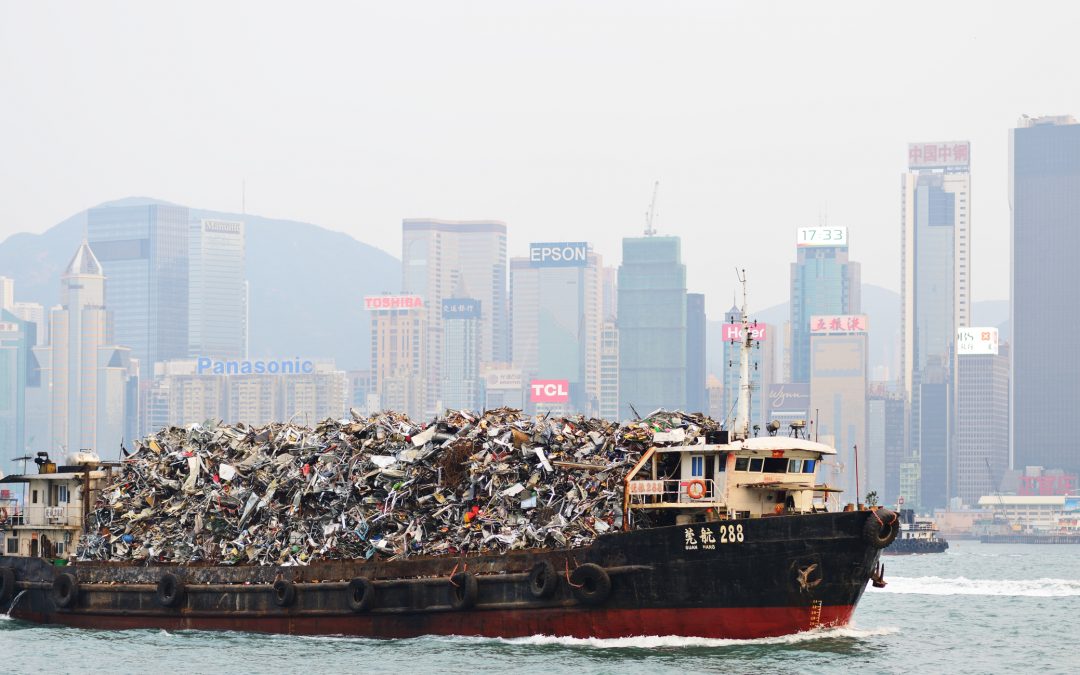Opportunity in the cleantech sector is best summed up by Isaac Newton’s Third Law of Motion, which is why the equal and opposite reaction to China’s refusal to continue to be the world’s trash dumping ground is going to be a colossal leap for sustainable supply chains.
For decades, China has been the world’s largest importer of waste, accepting as much as half the world’s trash, and according to Greenpeace, was receiving almost nine million metric tons of plastic scrap each year at its peak. Over the last six months, as a result of the ban, massive amounts of post-consumer plastic, unsorted scrap paper, and scrap textile materials in the United States are now ending up in domestic landfills.
Normally, this isn’t what I worry about on weekends, but as I peeled off the plastic bags from my dry cleaning yesterday and created a geologic form of non-recyclable plastic film visible on Google Maps, the scope of the problem hit home, and the connection that this is where cleantech shines.
When oil prices shot up to $100/barrel, sure, sales of hybrid cars and electric vehicles shot up, but the real innovation took place in industries which use oil to manufacture their products, starting with all plastics (including my dry cleaning bags), inks, cosmetics, tires, asphalt, chemicals, fertilizers, and crayons just to name some.
I’ve been fortunate to see Newton’s law at work in petroleum-free plastic sheeting and plastic cups and work for companies replacing petroleum-based synthetic rubber for tires with rubber alternatives from water-wise plants and reducing farmers needs for petroleum-based chemical fertilizers by recovering nutrients endemic in the waste stream.
And it’s not just a reaction to fossil fuel prices driving cleantech. In an earlier column, I mentioned a company who thought far enough down the supply chain to realize all 50,000 wind turbines currently operating in the U.S. will need replacing within the next 20-30 years, and the fiberglass made into something else instead of ending up in a landfill. Another company I’m fond of, Vartega, is using scrap material from the aerospace industry to create its carbon fiber for a variety of products.
Hopefully, these innovation outliers will become the reactive norm in other industries in the wake of China’s action to reduce foreign garbage because the ban has serious consequences. The recyclables you collect at home are now often ending up in landfills. Republic Services, one of the nation’s largest waste haulers diverted more than 2,000 tons of paper to landfills in just the Pacific Northwest since the Chinese ban went into effect at the beginning of the year.
Plastics-to-fuels for polyethylene and polypropylene is one promising option for non-recycled plastics, while companies like ByFusion are turning waste plastic into building materials, which count towards LEED Certification. With waste plastics now being landfilled (read: low cost or free) how long will it be until we see it incorporated into road construction? In a related industry, Volvo has already announced they will be using 25% recycled plastic in all cars by 2025. Other car companies won’t be far behind.
How about all of those cardboard boxes from Amazon and every other retailer showing up on your doorstep? I met the CEO of a company called Clean Fiber, who manufactures cellulose insulation for homes from recycled cardboard and other clean paper feedstocks.
I could go on and on, but as the saying goes, necessity is the mother of invention, and nowhere is that truer than in the cleantech sector. May it stay in motion, grow in mass and accelerate, and continue to react to society’s challenges.

